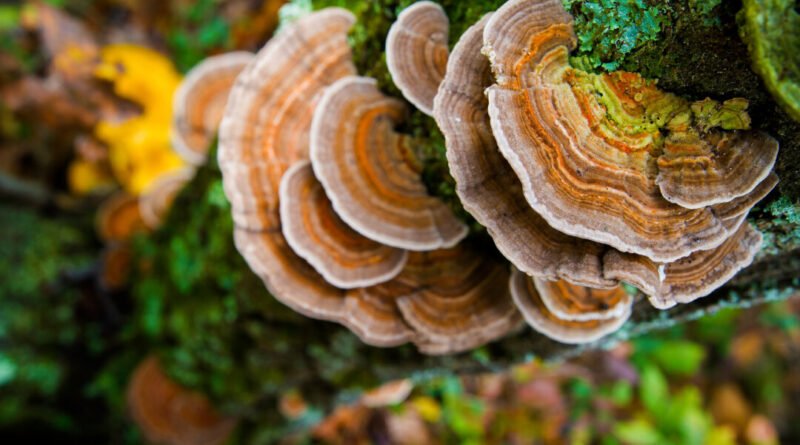Naturally Boost Your Immune System and Combat Cancer with Turkey Tail
The Power of Turkey Tail Mushrooms for Cancer and Immunity
The magnificent turkey tail mushroom has been used medicinally for millennia in Asia and is now being used to support conventional cancer treatment. Turkey tail, or Trametes versicolor (previously known as Coriolus versicolor), is a bracket fungus and member of the polypore family. Found almost anywhere in the world where there are trees, they grow on dead and dying wood, branches, and fallen logs. Turkey tails are easy to find and ubiquitous in North American forests. Named for their colorful concentric rings that resemble the tail feathers of a turkey, they’ve been used medicinally throughout Asia for thousands of years.
Although not particularly delicious as its texture is tough and leathery, harvested turkey tail is usually dried, turned into a powder, and made into tea. It can also be added to foods—like soups, stews, and smoothies. Turkey tail is a powerful medicine. Rich in antioxidants, it boosts the immune system, supports digestion, benefits the microbiome, and supports cancer treatment. It is also one of the best-researched medicinal mushrooms, with over a thousand entries in the PubMed database.
Boosts the Immune System
Mushrooms have been used for millennia in Chinese medicine for their immune-enhancing effects and are revered for their ability to fortify the body, boost immunity, and enhance longevity.
One of the ways mushrooms affect the immune system is by stimulating the production of cytokines. “Cytokines are small, soluble proteins that act as intracellular mediators in an immune response,” according to a review titled “Immune Modulation From Five Major Mushrooms: Application to Integrative Oncology published in Integrative Medicine: A Clinicians Journal.
The same review states: “It is well-established that mushrooms are adept at immune modulation and affect hematopoietic stem cells, lymphocytes, macrophages, T cells, dendritic cells (DCs), and natural killer (NK) cells.
Extensive research over the last 40 years has demonstrated that mushrooms have potent antineoplastic properties that slow growth of tumors, regulate tumor genes, decrease tumoral angioneogenesis, and increase malignant-cell phagocytosis. Additionally, evidence suggests that medicinal mushrooms may safely boost chemotherapeutic efficacy and simultaneously protect against bone marrow suppression.” Turkey tail is adaptogenic, meaning it helps our body adapt to stress by managing its harmful effects.
Mushrooms and Cancer
Turkey tail mushrooms contain bioactive compounds called beta-glucans, which include polyssaccharide-K (PSK), also known as krestin, and polyssaccharide peptide (PSP). These compounds have potent anticancer effects that include inhibiting tumor growth, inhibiting metastasis, helping fight cancer cells, modulating the immune system, and suppressing inflammation. Related Stories Turkey tail and other medicinal mushrooms like reishi (Ganoderma lucidum), shiitake (Lentinus edodes), and maitake (Grifola frondosa) are approved adjuvant therapies to standard cancer treatments in China and Japan and have been for more than three decades. According to a review, both PSK and PSP have documented anticancer activity in cell studies, animal studies, and human trials.
PSK has been used effectively for treating gastric, esophageal, colorectal, breast, and lung cancers. PSP helps improve “the survival and quality of life in patients suffering cancers, hepatopathy, hyperlipidemia, chronic bronchitis, and other complex diseases,” according to an article in Progress in Molecular Biology and Translational Science.
A systemic review and meta-analysis compared the safety and efficacy of PSK for patients with gastrointestinal cancer who used chemotherapy, and those who didn’t. Gastrointestinal cancer refers to a group of cancers that include liver, pancreatic, esophageal, gastric, and colorectal cancer. A total of 23 trials that involved 10,684 patients were included. The review found that treatment with PSK substantially increased overall survival between 1–5 years, was positively associated with overall survival between 6–7 years, and substantially increased 1–7 disease-free survival, as well as there being no increases in side effects. The meta-analysis concluded that when used in conjunction with chemotherapy, PSK was superior, finding that the combination dramatically increased three and five-year survival overall, leading the authors to conclude that PSK was safe and efficacious for patients with gastrointestinal cancer… Read More
Sources: https://www.news-medical.net/life-sciences/The-Potential-of-Medicinal-Mushrooms.aspx
Source link




